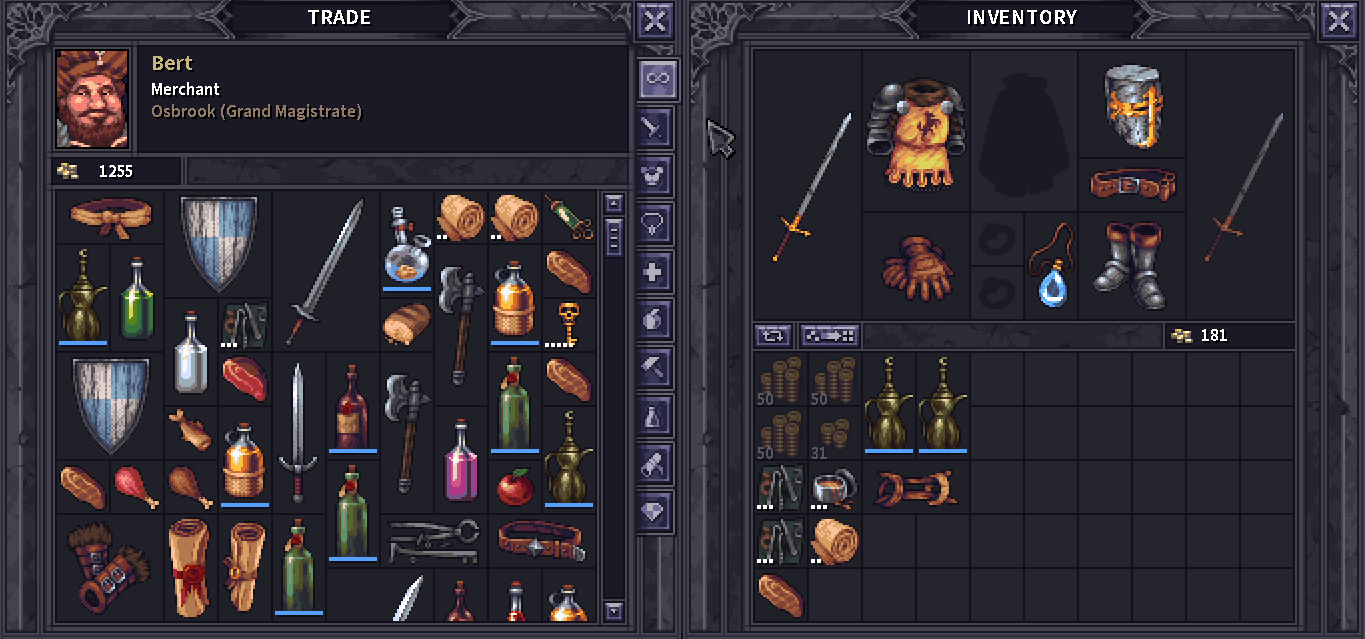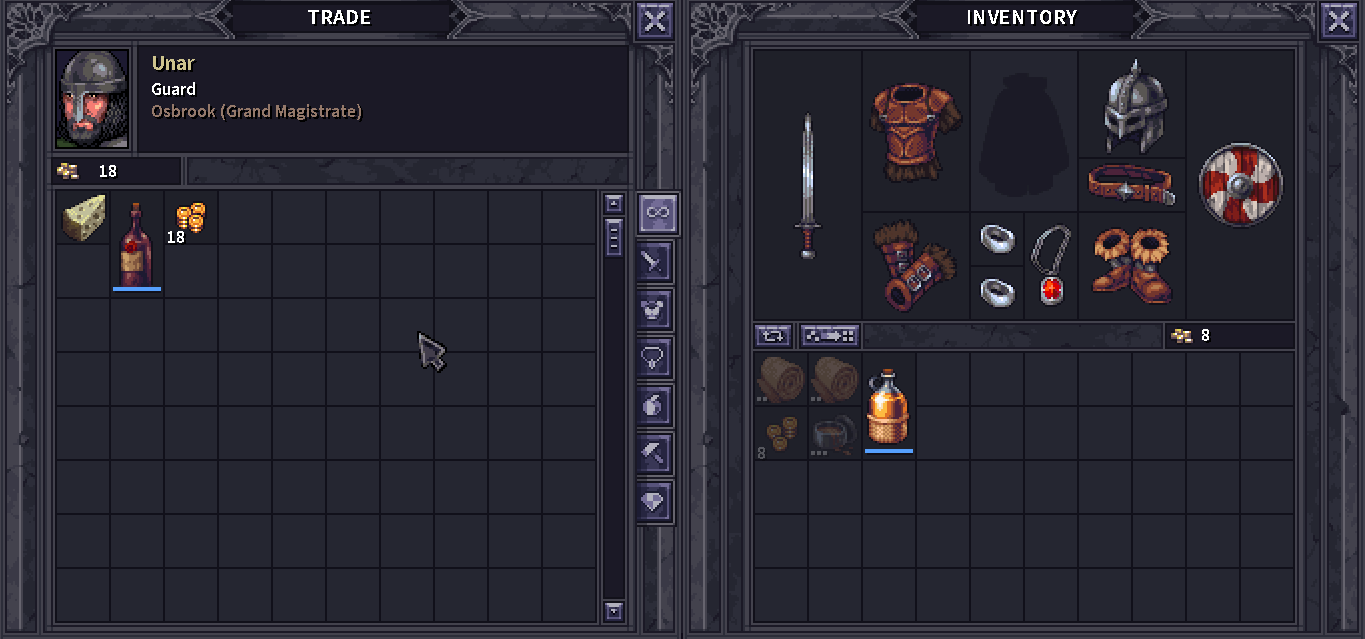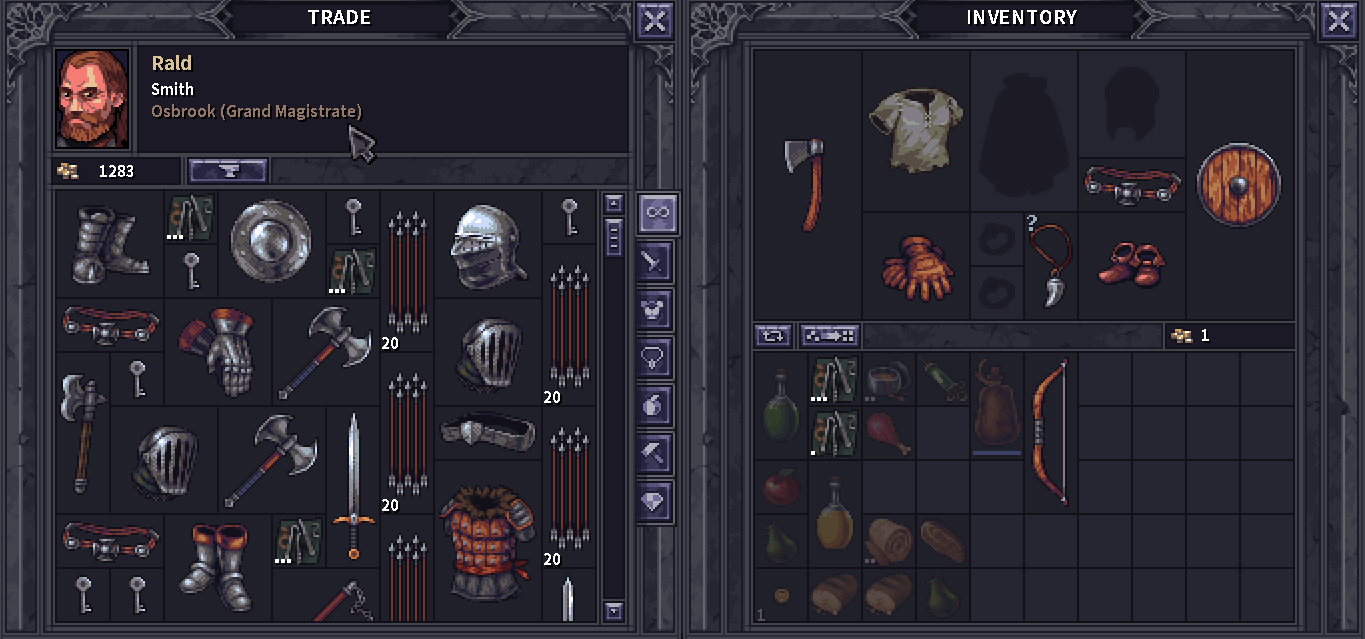Devlog: Factions Lore

Hello!
While more large-scale features are still under development, we’ve decided to start a series of posts dedicated to the Stoneshard setting to finally share some bits of lore with our community.
Since the start of development, the game’s lore changed several times, until we come to the variant suiting everyone. If at first we planned to show a rather typical high-fantasy sword-and-sorcery world, we distanced from this initial concept the more and more as the development went on. Maybe some of remember something about the Last King, an undead army and other things – at the moment everything from the list was either scrapped or completely reworked.
As a result, we came to a rather mundane medieval world, where the influence of the magical and otherworldly is rather small, and Aldor is a small once-kingdom, stuck in a civil war between three rivalling factions. In the game you’ll have to constantly balance between them, because gaining allies in one particular faction will always mean making some enemies in the other ones.

"Loyal to the end"
The Council is a group of the most influential Aldor feudals, united around the Regent-Queen and her young son Verne – allegedly the legal heir.
Inora, King Etbert's last wife, married him several months before his untimely death. This marriage was a complete surprise for the whole court - even the nosiest gossipers were surprised by the news. The sudden death of the monarch, soon to follow, became the basis for the rumor that Inora had killed her husband – and her son Verne, born after the Etbert’s death, doesn’t have even a single drop of royal blood in his veins.
Nevertheless, there were plenty of people who believed the Queen. Thanks to her natural cunning and diplomacy, she managed to find many influential allies among nobles – who formed the Council later.
The backbone of the Council consists of two seemingly opposing groups. The first is the Etbert’s old guard – the loyalists who held important posts during his reign. They see Verne as the legitimate successor of the dynasty, which they faithfully served all their lives. The second group consists of those who fell into disgrace during the King Etbert’s rule. For them supporting Inora is a reliable way to regain lost influence and reintegrate into the court life.
However, all of them pursue the common goal: to put down the insurrection and destroy the rebels; restore the crown’s power throughout Aldor; and raise Queen to the throne.

"Free man's wealth is a tyrant's demise"
The Great Magistrate is a union of city councils, rebellious aristocrats, as well as artisan and merchant guilds – all fighting for their independence from the royal court.
The roots of Great Magistrate formation lie in the long-standing conflict of King Etbert and the city of Brynn. Having come to power, Etbert deprived Brynn of its free city status. This autocratic move earned him enemies among Brynn’s influential families. And all these years they only waited for the right moment to restore trampled justice.
After the king died and the Inora laid claims to the throne, the Brynn’s city council unanimously voted to quit Aldor, if it would be ruled by an impostor. Surely, the burghers were somewhat deceitful – they weren’t going to tolerate any more power over themselves, and Verne’s unclear origin was just a good excuse. Many neighboring settlements, tired of feudal oppression, followed their example. This union was called the Great Magistrate – since any decisions are discussed by representatives of all the member settlements.
Thanks to the rich treasury and the wide use of mercenaries, the Magistrate fought with the Council on an equal footing, not yielding even an inch of its land. The obtained status quo was finally consolidated after the outbreak of the Crimson Plague – frightened by the unprecedented illness, the parties declared a truce to curb the epidemic.
Taking advantage of the resulting respite, the Magistrate only grew in power, rebuilding everything destroyed by war and sending ambassadors abroad. By the way, this gives the Council another significant reason to call Magistrate followers traitors – as they say, the Magistrate’s ties with Jacinth elves are much closer than is required for commerce.

"Purge the immoderate"
The Gray Army is a folk uprising that has taken on an enormous scale recently. The composition of the Gray Army is quite dissimilar – the majority are peasants and artisans, but there are other groups as well: former brigands, clerics-in-doubt, broke feudal lords and Magistrate or Council armies deserters.
For several years, the common people meekly endured all the war: they fought under the banners of the Council and the Magistrate, paid wartime taxes, watched lawlessness and violence, suffered from hunger and disease, and died – by thousands. However, the longer the war went on, the louder the grumbling became.
These moods were skillfully used by Nir – a man of unknown origin, and therefore even more mysterious and frightening. A former monk; runaway slave; criminal on the run; feudal lord, who lost his mind after losing his title – there are so many rumors regarding his possible past, the safest bet is not to believe any of them.
The philosophy of the movement is quite confusing and controversial – mainly because only Nir himself grasps it fully. The rest only has to interpret the scattered fragments of his statements – the so-called Words. The Gray Army considers immoderation and incontinence in all its manifestations to be the most important cause of all evil. Nir believes that the ability to find and keep a fine line is paramount, and only in this way people can protect themselves from corruption.
Due to the multiplicity and desperate courage, the Gray Army managed to occupy numerous territories, having won several settlements from the Council and the Magistrate. Now the Army is looking forward to the end of the truce – to finally finish off all those who deny their dogmas.
=====
That's all for today. Stay tuned for the next update about some game mechanics in two weeks!
Also you can follow us on:
https://store.steampowered.com/app/625960/Stoneshard/

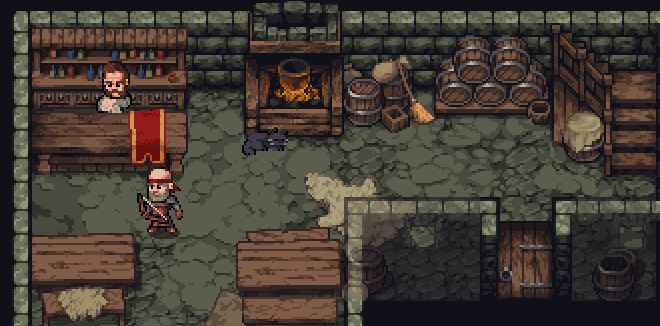
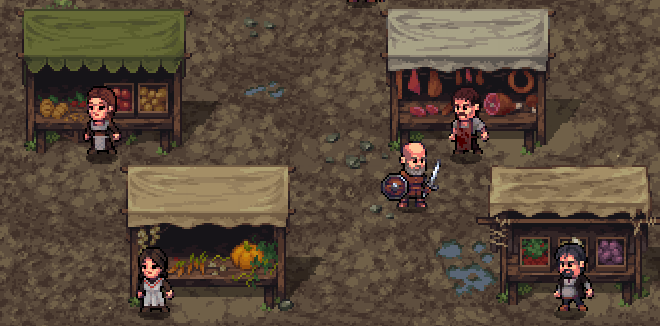


 Please keep in mind all English texts are WIP and hadn't been yet professionaly translated and proofread.
Please keep in mind all English texts are WIP and hadn't been yet professionaly translated and proofread.
 Troll concept. Don't feed him.
Troll concept. Don't feed him. Nothing like pillaging someone's grandgrandfather's tomb!
Nothing like pillaging someone's grandgrandfather's tomb! Well.... I guess... I'm here?
Well.... I guess... I'm here?





